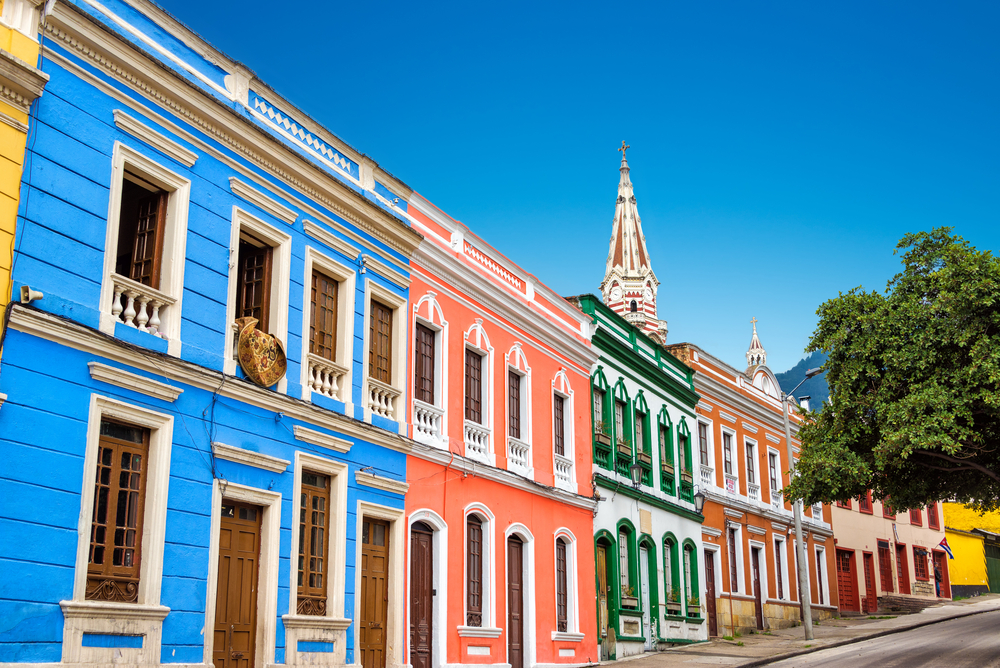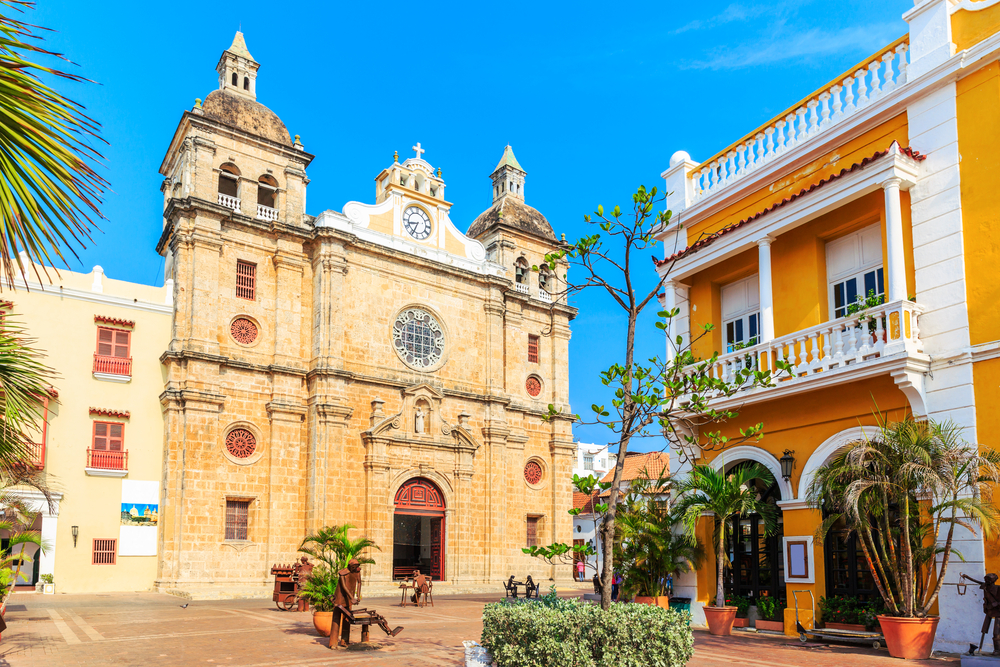Why Colombia?
Our Travel Specialist Thomas has returned from a recent trip to Colombia where he found himself faced by a question…
Why visit Colombia? I am asked as we board the bus from Bogota airport to our hotel. I’ve rarely arrived somewhere to be asked to think about why, as a visitor, I am there in the first place. Our guide, Pedro, perched over a seat and grasping his microphone as we swerve through traffic, hypothesises: What draws travellers to Colombia? Why is its popularity growing constantly? How much is Narcos responsible for the peak in interest? Here I retreat, conscious of how irksome it must be for Colombians when naive Westerners profane wanting to ‘walk-in Pablo Escobar’s steps’. But far from vilifying Narcos as a negative portrayal of a country through its dark history, Pedro talks of embracing the opportunity that such programmes as Narcos have given the country to attract tourists. He speaks of this new influx of inquisitive people from around the world as an opportunity to change people’s impression as they arrive in Colombia, challenging their perceptions as they encounter a society on the mend.
The overwhelming tone of Pedro’s discourse is positive. In a world greyed with political upsets, it is a lovely feeling to arrive somewhere where overall things seem to be progressing in a positive direction. Colombia is the first country in the world to begin the transition process towards peace before the end of the conflict. A peace deal, between Government and FARC, was finally signed in 2016. Pedro speaks in earnest of these things with a genuine smile on his face, mentioning in passing that he was one of the people to help write it. Of course, not everything is perfect, and there is a long way to go to repair the wounds left behind by years of internal conflict. However, Pedro says, we will be discovering ways people are actively engaging in efforts toward peace during our time in his country.
This, I realise as we approach our hotel, is what makes Colombia so interesting: the fact that history is happening here and now. The best way to tap into the country as a traveller, I firmly believe, as well as of course exploring some of Colombia’s rich ancient history, is to delve into Colombia as a living and changing place, where everything is still yet to be made. As Pedro says in his last statement: ‘We, as travellers, are ambassadors for a country that is opening its doors’.
On the next day when I wake up, I am excited
-To get rid of elicit crops
-To bring opportunity to rural areas that will suffer from this
-To help communities participate in politics
-To satisfy four important rights for the victims of conflict: truth, justice, reparation and to ensure that the conflict never occurs again

Our first stop is the Cafe Wuasikamas. We arrive at a lovely spot in La Candelaria, Bogota’s Colonial district. Refined crafts and intricate hand-made objects line the walls. It takes a bit of time to decipher amongst these the pictures hung up: hectares of illicit crops, rural communities gathering, crops being destroyed. These pictures are glimpses that trace the history of a small community high up in the Andes.
Our host, who is under state protection, enters. He is the leader of the community stilted in these snapshots, one of many that made the decision to destroy all ilicit crops and turn towards the production of beans for coffee and cocoa for chocolate. We sit in awe as he recounts, in Spanish, the trials and tribulation the village had to face throughout this process. Pedro translates frantically. Our narrator has become an ambassador for local communities wanting to eliminate their place in the illicit drug trafficking industry, communities in which not one death has occurred since the transition.
This moment is one of the most fascinating I have experienced, and I encourage all those who are given the opportunity to engage in such encounters. We are encouraged to buy crafts from the cafe, all proceeds going to the rural communities. Next, we are taken to a chocolate shop, based on the same principles. Our new host explains how he decided to lead his community out of the darkness for his children. With proud eyes tainted by the presence of a darker past, he steps back as his son, studying a Masters in International Relations, talks to us as an embodiment of new hope. Again, we indulge in the delightful produce this new commerce offers, and verily agree that coffee and chocolate prevail over illicit substances. Pedro talks of different projects like these, all focused on meeting the four main challenges the peace process entails
Women weaving a gigantic cloth with their stories of conflict to cover the palace of justice being one of them. Minds buzzing, our tour ends in Salvo Patria, a restaurant that works with communities to produce exciting traditional dishes with delicacies local to different rural areas in Colombia. This is one of the most hands-on meal experiences I have ever had: each element of my plate is tied to a place in Colombia and a story by our chef who brings the dishes to life with relish.

Our next stop is Cartagena. The airport doors open to a completely different atmosphere and ecosystem to Bogota. The sweltering heat takes some adjusting to but comes to temper our experience of the city with a different flavour to the capital. Colombia’s disjointed landscape is both a blessing and a curse. The country has five different ecosystems, it is the second most biodiverse in the world, and yet this makes unity difficult to come by. Things are easy to hide in the folds and pockets of the land. But as we bustle our way into the beautiful walled city, there is a sense that Cartegena is somewhere to be enjoyed in a way very different to Bogota. Our experience of Bogota was riveted in the intense experience of current political endeavours. There is a moment in which one must set aside the politics to merely enjoy and rejoice in the plurality that Colombia offers. Cartegena is a city that celebrates its disjointedness.
We walk past a group of Palenqueras, women who have become an emblem of the city as a mix of different influences, ancestries and cultures. This is what makes Colombia so special: its plurality and lack of uniformity. The mismatch of buildings come as dashes of colour that streak our perspective with life as we pace through the city in the heat. The next day, we visit the Aviary, alive with a myriad of birds saved and brought to this space guided by an effort towards rehabilitation. We board a boat towards the paradisiacal Rosario Islands, dotted with wonderful luxurious resorts offering an experience of peace and tranquillity I didn’t know I wanted. We pass through the Bocagrade district with its completely different feel, buildings reeling up towards the sky. Everything comes alive in this difference, in the range of influences, buildings, people.
That evening we are treated with a surprise. We will find ourselves in quite an unusual setting for our last culinary experience in Colombia: San Diego, the largest women’s prison in the city. The Restaurant, named Interno, was set up as a project to help inmates towards rehabilitation. The women work, waiting on tables, cooking and entertaining guests. Our host, who speaks English, welcomes us warmly. Here, the inmates’ energy is focused on doing something productive. All their wages go to their families and a day worked here takes a day off their sentence. Again, as we indulge in the delightful dishes presented to us, I am touched by the remarkable programmes set up to help people aspire to do something positive, dragging themselves out of their dark pasts to try to establish themselves as productive members of society.
Our departure from Colombia jolts onto us too soon. I leave as a proud ambassador for a country that has so much to give.
If you feel ready to begin creating your perfect Colombia holiday, simply complete the enquiry form to get in touch, or call our Travel Specialists on 0208 546 6222.
Leave a Reply